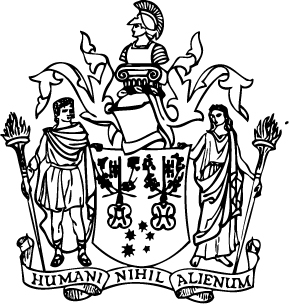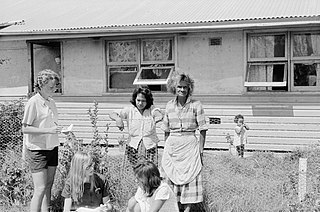Henry Reynolds is an Australian historian whose primary work has focused on the frontier conflict between European settlers in Australia and Indigenous Australians. He was the first academic historian to advocate for Indigenous land rights, becoming known with his first major work, The Other Side of the Frontier (1981).

The Australian Academy of the Humanities was established by Royal Charter in 1969 to advance scholarship and public interest in the humanities in Australia. It operates as an independent not-for-profit organisation partly funded by the Australian Government.

Alan George Lewers Shaw was an Australian historian and author of several text books and historiographies on Australian and Victorian history. He taught at the University of Melbourne and the University of Sydney, and was professor of history at Monash University from 1964 until his retirement in 1981.
Marilyn Lee Lake, is an Australian historian known for her work on the effects of the military and war on Australian civil society, the political history of Australian women and Australian racism including the White Australia Policy and the movement for Aboriginal and Torres Strait Islander human rights. She was awarded a personal chair in history at La Trobe University in 1994. She has been elected a Fellow, Australian Academy of the Humanities and a Fellow, Academy of the Social Sciences in Australia.

Genevieve Bell is the Vice-Chancellor of the Australian National University and an Australian cultural anthropologist. She is best known for her work at the intersection of cultural practice research and technological development, and for being an industry pioneer of the user experience field. Bell was the inaugural director of the Autonomy, Agency and Assurance Innovation Institute (3Ai), which was co-founded by the Australian National University (ANU) and CSIRO’s Data61, and a Distinguished Professor of the ANU College of Engineering, Computing and Cybernetics. From 2021 to December 2023, she was the inaugural Director of the new ANU School of Cybernetics. She also holds the university's Florence Violet McKenzie Chair, and is the first SRI International Engelbart Distinguished Fellow. Bell is also a Senior Fellow and Vice President at Intel. She is widely published, and holds 13 patents.
Anna Elizabeth Haebich, is an Australian writer, historian and academic.
Jennifer Ann Marshall Graves is an Australian geneticist. She is Distinguished Professor within the La Trobe Institute for Molecular Science, La Trobe University, Australia and Professor Emeritus of the Australian National University.
Jane Simpson is an Australian linguist and professor emerita at Australian National University.
Marie Olive Reay was an Australian anthropologist, known particularly for work in the New Guinea Highlands.
Patricia Ann Grimshaw, is a retired Australian academic who specialised in women's and Indigenous peoples' history. One of her most influential works is Women's Suffrage in New Zealand, first published in 1972, which is considered the definitive work on the story of how New Zealand became the first country in the world to give women the vote.
Janet Susan McCalman, is an Australian social historian, population researcher and author at the Melbourne School of Population and Global Health, University of Melbourne. McCalman won the Ernest Scott Prize in 1985 and 2022 (shared); the second woman to have won and one of eight historians to have won the prize twice.
Joy Damousi, is an Australian historian and Professor and Director of the Institute for Humanities and Social Sciences at Australian Catholic University. She was Professor of History in the School of Historical and Philosophical Studies at the University of Melbourne for most of her career, and retains a fractional appointment. She was the President of the Australian Academy of the Humanities from 2017 to 2020.

Ann Curthoys, is an Australian historian and academic.

Lesley Head is an Australian geographer specialising in human-environment relations. She is active in geographical debates about the relationship between humans and nature, using concepts and analytical methods from physical geography, archaeology and cultural geography. She retired from the University of Melbourne in 2021.
Ann Veronica Helen Moyal AM FRSN FAHA was an Australian historian known for her work in the history of science. She held academic positions at the Australian National University (ANU), New South Wales Institute of Technology, and Griffith University, and later worked as an independent scholar.
Allan William Martin AM FASSA FAHA (1926–2002) was an Australian historian. He wrote numerous works on Australian political history.
Lynette Wendy Russell, is an Australian historian, known for her work on the history of Indigenous Australians; in particular, anthropological history ; archaeology; gender and race, Indigenous oral history, and museum studies.
Diane Elizabeth Kirkby, is an Australian historian. She is Professor of Law and Humanities at the University of Technology Sydney and professor emeritus of History at La Trobe University. Since 2016, Kirkby has been the editor of Labour History, the journal of the Australian Society for the Study of Labour History.
Mardi Helen Dungey was an Australian macroeconomist.
Janna Lea Thompson (1942–2022) was an American-born philosopher and ethicist, who spent the majority of her academic career in Melbourne, Australia. She is best known for her work on reparative and intergenerational justice.




